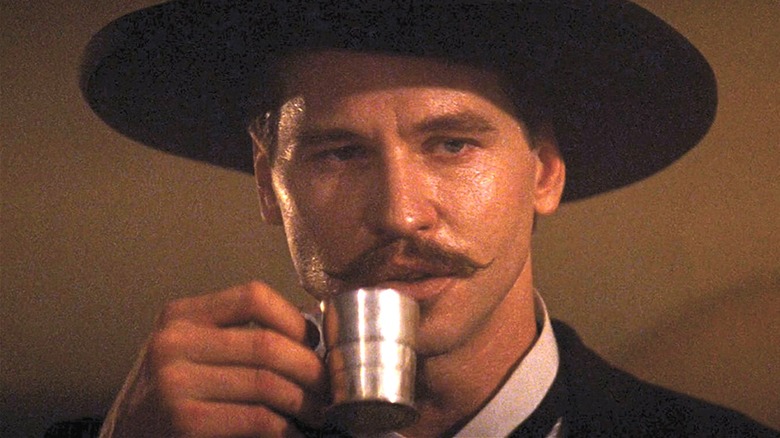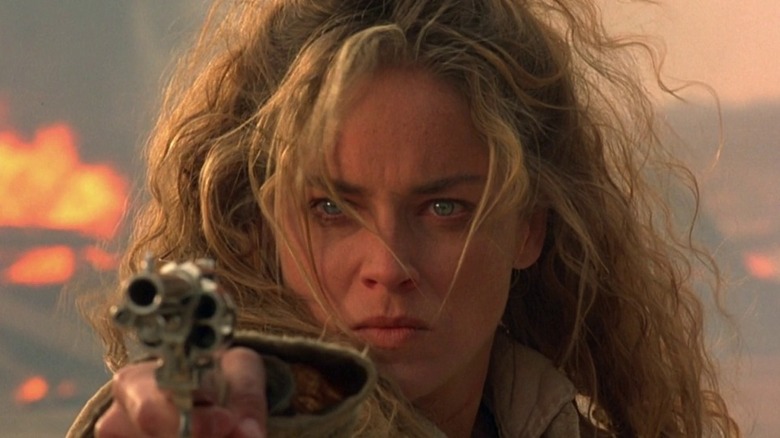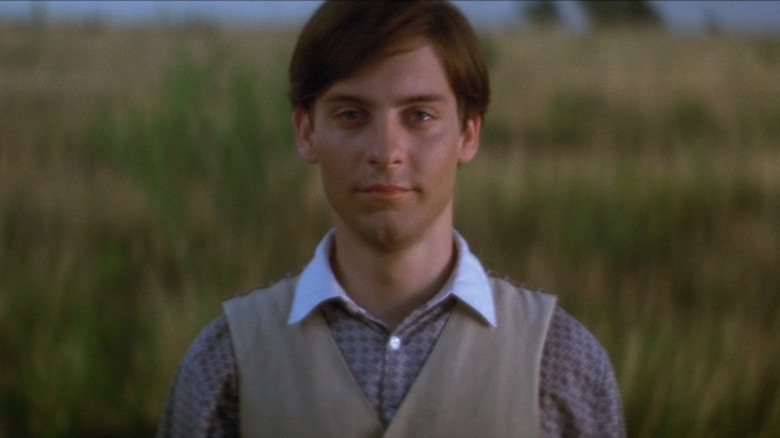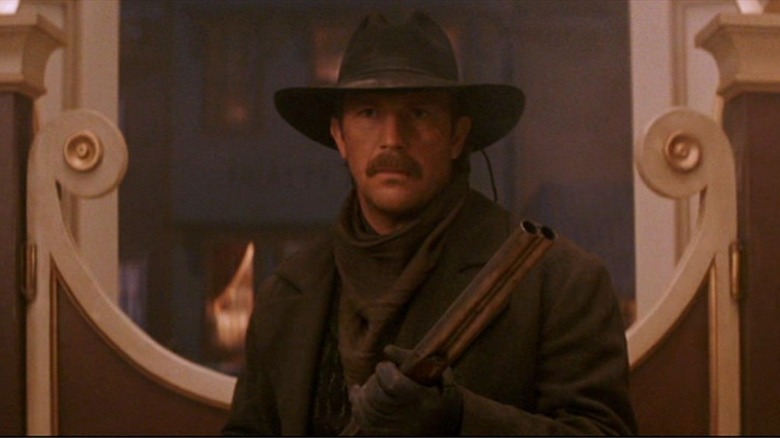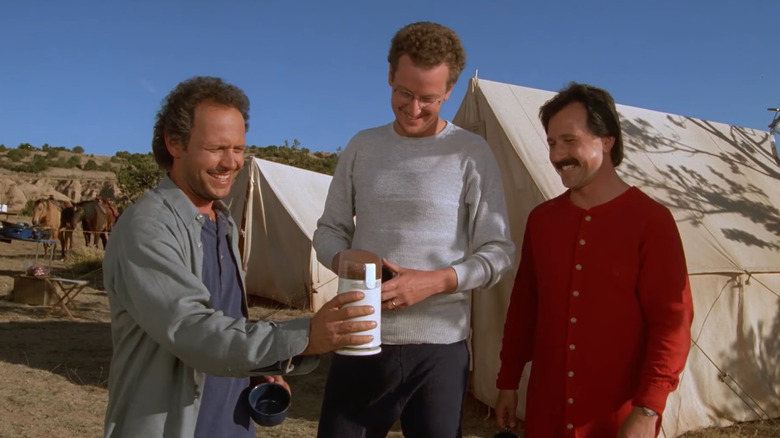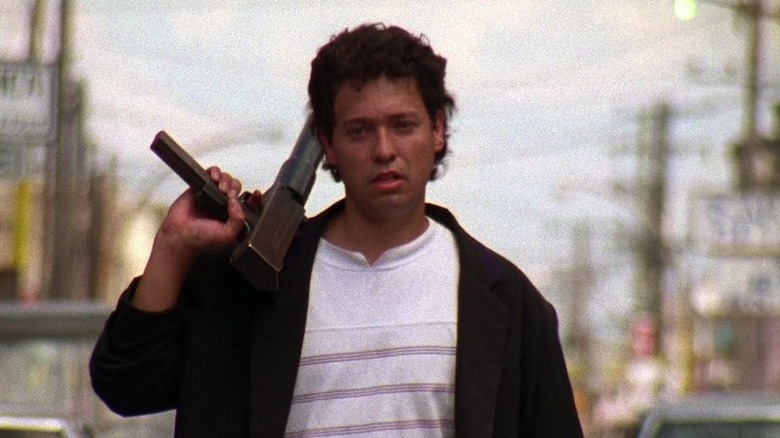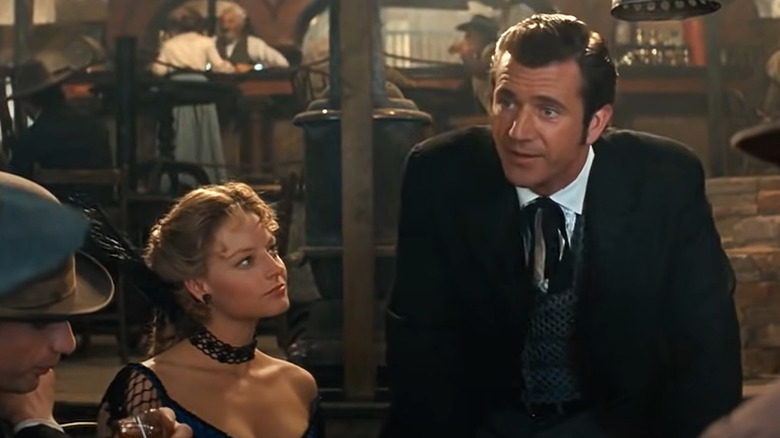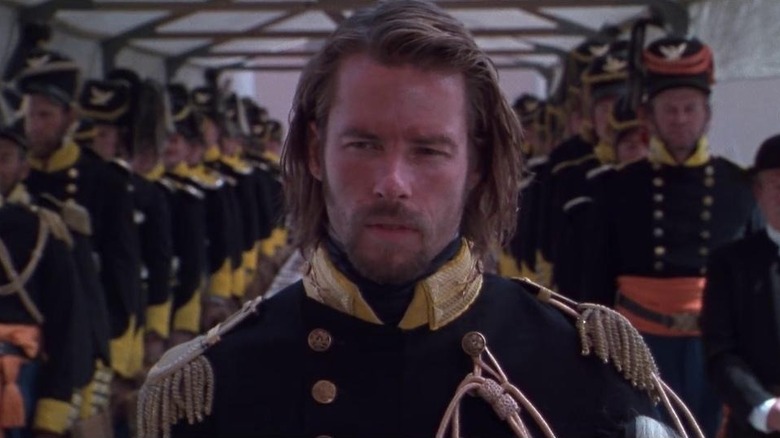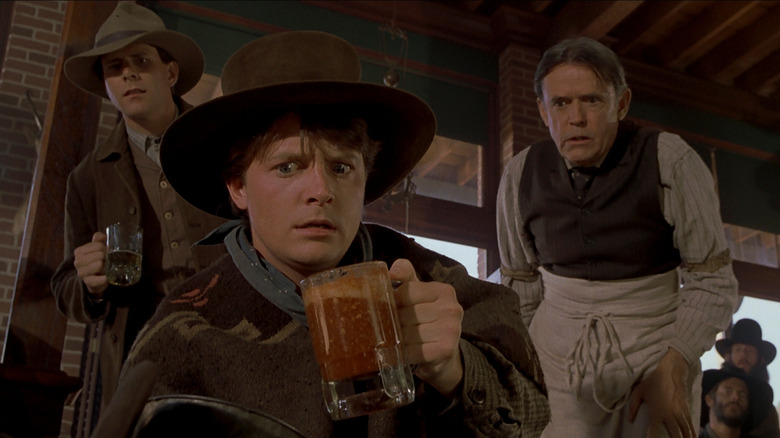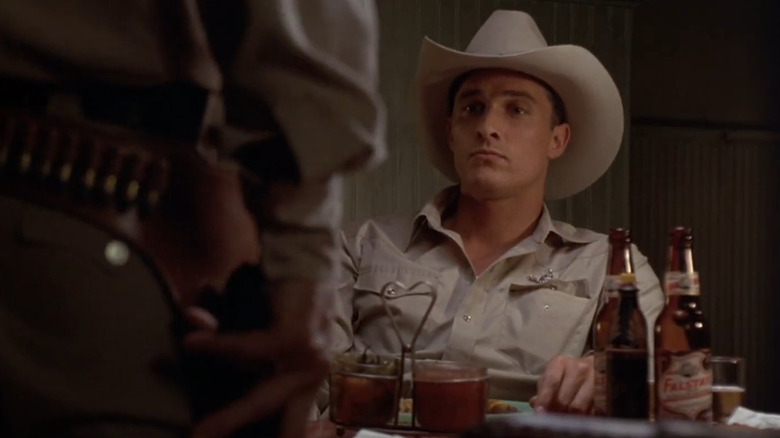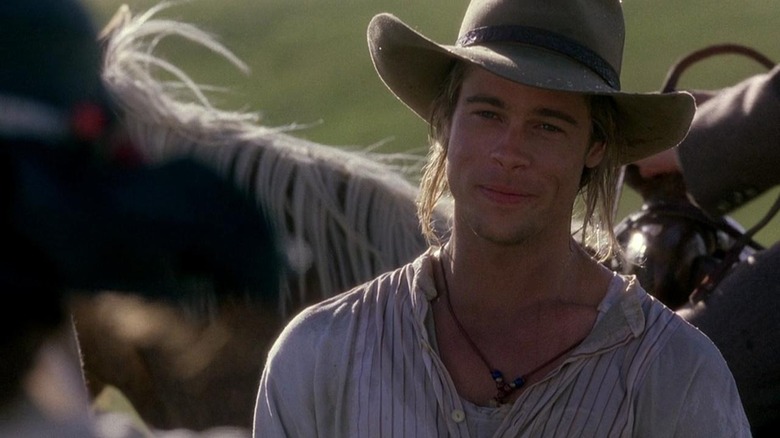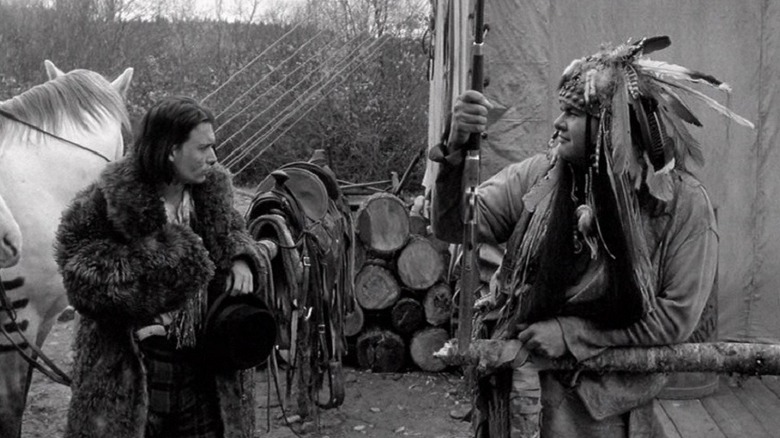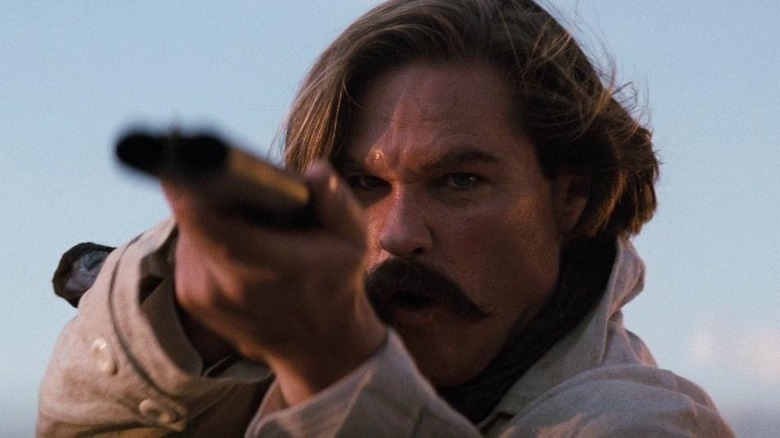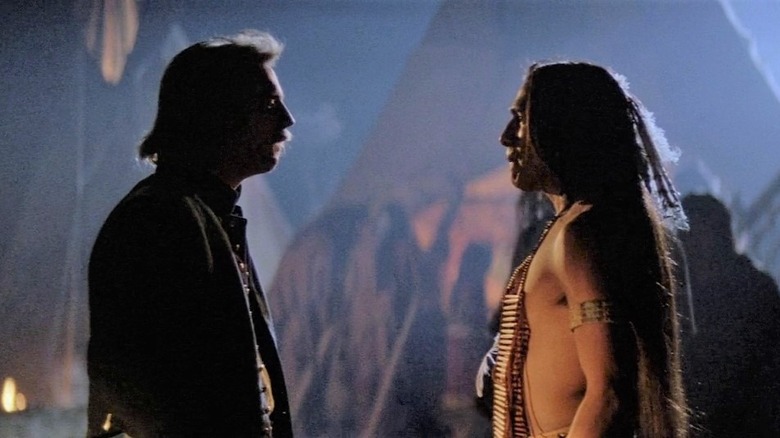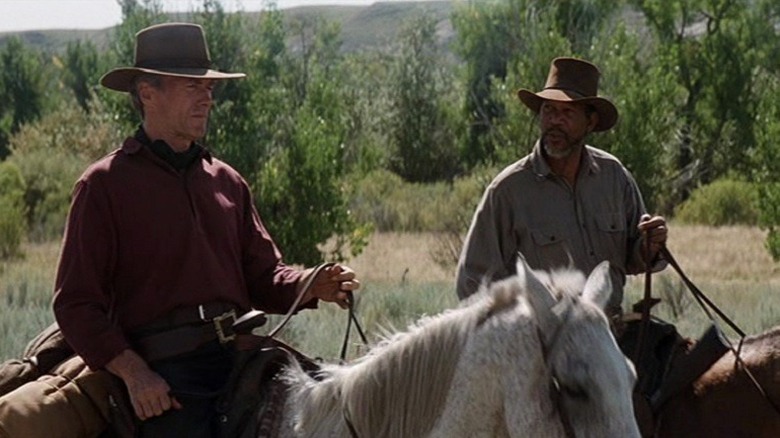The Most Iconic '90s Westerns Ranked Worst To Best
When you take a step back (spurs rattling, chaps flapping in the breeze), the 1990s aren't usually the first thing that comes to mind when you think of the Western genre. Looking at cinema history with a bird's eye view, it's much easier to be enraptured by earlier examples of the genre's decade-spanning journey on the big screen — the stunt-filled epics of the 1940s; the heroic, technicolor panoramas of the Hollywood Golden Age; the sweaty close-ups and brutal cynicism of the Euro-Westerns of the 1960s and 1970s.
But what of the 1990s? Well, if you're a Western appreciator, you'll be keenly aware that the genre did not, in fact, ride into the sunset before the dawn of the new millennia. Indeed, while the heroics and uncritical Americana of the genre's early days are no more, the Western never really left. Sure, it may have assumed more of a self-conscious posture, adapting over time to call its own faults, sins, and bugbears into question. But Westerns not only permeated the '90s, they enjoyed a full-blown revival. And a good handful of them are as iconic, memorable, and beloved as any Golden Age John Wayne swagger or neo-noir-tinged Anthony Mann period piece.
So giddy up and read on for our look at the most iconic Westerns of the 1990s. Sure, we're ranking these amazing films from "worst" to "best," but the "worst" movies here are still incredible rides that definitely deserve a watch. Steel yourself for adaptations of the life, times, and many attempted retirements of the gunslinger Wyatt Earp, plenty of Kevin Costner, and more genre mishmashes than you can shake a bullwhip at. Yeehaw.
14. The Quick and the Dead
Now listen, we know what you're thinking: Why hasn't anyone made a Western in the style of a "Looney Tunes" cartoon? Well, you're in luck. Because in 1995, Sam Raimi (the genius/madman behind "Spider-Man, "The Evil Dead," and "Drag Me to Hell") did exactly that. For all his genre dabbling (be it in exploitation film or comic book fare), Raimi has always had a distinctive and unapologetically no-holds-barred sense of physical comedy — an instinct that often expands to the cinematography itself. Much of Raimi's work benefits from the kind of old-school cartoon logic where the rules of physics are out the window but the possibility of bodily harm is through the roof.
"The Quick and the Dead" sees Raimi applying his elastic sense of humor and visual panache to the Western genre. The film is set in a town renowned for its quick-draw competition, where the speediest gunslingers in the West put their lives on the line for fame, fortune, and the all-important bragging rights. But for Ellen (Sharon Stone), the competition is personal — an opportunity to strike down the ruthless outlaw (Gene Hackman) who killed her daddy. Boasting more split diopter shots than you can shake a stick at and an unbelievable ensemble of talent (including Russell Crowe, Keith David, and a young Leonardo DiCaprio), "The Quick and the Dead" is a hoot and a half.
13. Ride with the Devil
Director Ang Lee is a man of many genres. From erotic period pieces ("Lust, Caution") and wuxia fantasy films ("Crouching Tiger, Hidden Dragon") to comic book movies ("Hulk") and literary adaptations ("Sense and Sensibility"), we have to ask: Is there anything Ang Lee can't do? Case in point — 1999's "Ride With the Devil," the director's thoroughly unique and striking foray into the Western genre.
Set in a vague, liminal space between Union and Confederate territory, the film follows the unlikely friendship of four individuals from radically different backgrounds who manage to carve out a space for themselves in a tumultuous period in history. As their ostensible loyalty to the Confederacy is tested, the gang find themselves reluctantly caught in a bloody conflict pitting brother against brother, when they would much rather start families, secure their freedom, and avoid killing others if at all possible.
Torn between being a war film, a Western, a revenge thriller, and a romance, "Ride with the Devil," is as untraditional as the rest of Ang Lee's work. Which is, in all fairness, a good thing. This is not a film that glorifies conflict, duty, or nationalism. Rather, it's a beautiful and measured portrait of a slow, societal death — the end of one chapter of American history ... and the beginning of something new.
12. Wyatt Earp
In the 1980s and 1990s, there were two surefire ways to tell if you were watching a Lawrence Kasdan project: the Lucasfilm logo and Kevin Costner. With respect to Westerns, it's the latter that concerns us. Kasdan and Costner were frequent and fruitful collaborators. And not one but two of these collaborations saw the pair riding off into the sunset. While (unfortunately) the incredible "Silverado" falls outside the chronological scope of this article, their subsequent joint venture, "Wyatt Earp," is equally worth recommending.
Released in 1994, the film (as its title suggests), lays out the life, times, loves, and losses of one of the most iconic figures of the Wild West. With Costner starring as the titular Wyatt Earp, the historical epic charts various chapters in the gunslinger's life, from his move out West as a teen to the infamous gunfight at the O.K. Corral. Armed with one of the most stacked casts the 1990s had to offer (including but certainly not limited to Gene Hackman, Catherine O'Hara, Michael Madsen, Isabella Rossellini, and Bill Pullman), "Wyatt Earp" is an epic in scope and scale, brimming with historical detail and pure, unbridled craft.
11. City Slickers
Was "Westworld" too much of a sci-fi downer for you? Wish you could just kick your boots up and enjoy a comedy about guys being dudes on a dude ranch? Enter: 1991's "City Slickers," a soft-edged comedy that sees a gaggle of guys facing their respective midlife crises by going on a Wild West-themed weekend getaway to try and reconnect with themselves.
Brimming with even-keeled goofiness and an uptempo sense of humor that never takes itself too seriously, "City Slickers" layers its lighter comedic touch with a big-hearted emotional center that sees three disillusioned middle-class city boys gently careening towards rediscovered their inner confidence. All through a cattle drive no less. Try and count all of the spirited, bromance hugs this movie has to offer, we dare you.
Never punching above its mild-mannered thematic concerns or attempting to make a mountain out of a bourgeois molehill, "City Slickers" is the kind of Sunday movie you put on at 11 AM while you feast on pancakes. It's easy watching. And as the film itself argues, sometimes simple things are all you need.
10. El Mariachi
Depending on who you ask, almost every film made by director Robert Rodriguez is sort of a Western. Lone, gun-toting cool guys — brows flecked with sweat, one-liners at the ready — riddle his filmography. And yet no film feels more purely rooted in what Rodriguez offers as a genre director than "El Mariachi," his 1992 feature film debut. Much as "Reservoir Dogs" introduced cinema to Quentin Tarantino at his most Tarantino-y, "El Mariachi" feels like Rodriguez' creative essence distilled in concentrated yeehaw form.
The Spanish-language film follows the titular Mariachi (Carlos Gallardo), a traveling musician who's mistaken for an assassin smuggling a weapon in a guitar case. With a very angry and unforgiving drug lord on his tail, this case of mistaken identity forces El Mariachi to tango with some very bad dudes, embroiling the musician in a plot flush with drugs, money, and lots and lots of guns. Funded with a less-than-a-shoestring budget of $7,000 US, "El Mariachi" sets the stage for what would ultimately become Rodriguez' "Mexico Trilogy," with 1995's "Desperado" and 2003's "Once Upon a Time in Mexico" to follow. An absolute blast boasting a contagious energy and an unforgettable sense of style, "El Mariachi" is a groundbreaking independent first and an excellent example of what '90s Westerns have to offer.
9. Maverick
Directed by the prolific and genre-spanning genius Richard Donner ("The Goonies," "The Omen," "Lethal Weapon"), "Maverick" — loosely based on the TV series of the same name — follows the titular Bret Maverick (Mel Gibson), a gambler and a con man who would much rather scam and hustle than shoot and tussle. Bar fights aren't his thing. He's a poker guy with sticky fingers. Which is a good thing because our boy needs to drum up three grand to enter a high stakes winner-takes-all poker tournament. Joining forces with a charming (and equally slippery) Southern belle named Annabelle Bransford (Jodie Foster) and crotchety marshal Zane Cooper (James Garner), the trio attempt to gather the necessary funds so they can get rich quick without, hopefully, risking their hides.
Boundlessly silly and jovial at a time in the '90s when Westerns were starting to strike a more serious pose, "Maverick" balances its big, vista-filled Western production with character-driven charm. If you're in the market for pure, unbridled fun that's loose enough to throw period accuracy to the wind (soundtrack albums were a big in the '90s), "Maverick" is the way to go.
8. Ravenous
While Westerns and the horror genre may seem like a wacky combination, the fact of the matter is that most, if not all, Westerns harbor an innate dark streak — the specter of Manifest Destiny and the strong-jawed lone rangers who glamorized American expansionism at the expense of the continent's indigenous residents. The cinematic Wild West has its roots in colonial myth-making. And while the genre gradually started to confront the skeletons in its closet, explicit ventures into unambiguous horror were (and remain) a rarity.
One glorious exception is 1999's "Ravenous," an impeccable film by Antonia Bird that punches in the correct direction with unflinching fervor and a mischievous glint in its eye. The film follows John Boyd (Guy Pearce), an American soldier who's sent to a remote, snow-bound outpost as a covert punishment for his inaction during a skirmish in the Mexican-American War. Just as Boyd begins to wrap his head around the isolation and quirks of the fort's residents, a naked, frozen stranger bursts through their door, rambling about a cannibalistic madman who decimated their party during a blizzard. As the fort sets out to investigate the last-known location of the killer, suspicions begin to fester that this stranger may not be who he says.
Blending Western tropes with Native American myth, "Ravenous" walks a thoroughly unique tonal tightrope, balancing a grisly historical horror story with a pitch-black sense of humor. Throw in a striking soundtrack performed by Michael Nyman and Damon Albarn (of Gorillaz fame) and you've got one of the most distinct, entertaining, and genre-fluid entries in the Western canon.
7. Back to the Future Part III
In the final instalment of the adventures of the intrepid teen Marty McFly (Michael J. Fox) and his senior citizen best friend, Doc Brown (Christopher Lloyd), the pair head back to one of the rootinest tootinest time periods: the Wild West. This third entry in the "Back to the Future" trilogy sees Marty and Doc transported to the 19th century, where their time machine immediately breaks down, leaving them stranded in a town full of saloons, rogue gun fights, and damsels in distress. This go-round, the dynamic duo tussle with ancestral bullies and sweet-hearted school teachers while they attempt to find a way back to their home in the present.
We have plenty of serious and introspective entries on this list. But "Back to the Future Part III" wears its love of Westerns plainly on its sleeve for all to see. The 1990 film is a celebration of cinema's long-standing love affair with the genre, with delightful references to all manner of Western mainstays, from "High Noon" to "Once Upon a Time in the West" and everything in between. If you're a fan of the genre and are looking for a charming throwback, "Back to the Future Part III" has got you covered (in dust, boiled leather, and tumbleweeds).
6. Lone Star
Written, directed, and edited by John Sayles, 1996's "Lone Star" hinges on a universal truth: All small towns have their secrets. And in the case of the small Texas border town in 1996's "Lone Star," the skeletons in the closet aren't just figurative.
After a corpse sporting a sheriff's badge is unearthed, the ensuing investigation leads the current lawman, Sam Deeds (Chris Cooper), to dig deeper. The consensus is that the bones probably belong to a notorious and widely hated sheriff, Charlie Wade (Kris Kristofferson), who was known for terrorizing local minorities. Soon, Sam begins to suspect that his predecessor, his father Buddy (Matthew McConaughey), may have been involved in Wade's disappearance.
A generation-spanning murder mystery about three sheriffs united by their job title but separated by attitudes, politics, and decades, "Lone Star" is keenly interested in one of the core themes that give the neo-Western its distinctive gait: the sticky nature of legacy and how myths about legendary "good" or "bad" men are rarely the whole story.
5. Legends of the Fall
Could you throw a rock at the 1990s without hitting a Western historical epic spanning well over 120 minutes? Arguably not! This list is absolutely littered with jumbo-sized chronicles of the glorious intersection between melodrama and masculinity. And 1994's "Legends of the Fall" is no different. Directed by Edward Zwick (who readers may know best for 1989's Civil War drama "Glory"), the film whisks us away to the plains and mountainous terrain of Montana where three sons (Brad Pitt, Aidan Quinn, and Henry Thomas) grapple with their duties on the ranch, romantic rivalries, and the outbreak of various historical events.
Earning Academy Award nominations for Best Art Direction, Best Sound, and Best Cinematography (the latter of which the film won), "Legends of the Fall" is sweeping and sumptuous with all the subtlety of a pulpy romance novel purchased in haste at an airport. Taken on its own beautiful, cheesy terms, "Legends of the Fall" also boasts one of the most moving scores of composer James Horner's career (which is, indeed, saying something).
4. Dead Man
Let's class up this joint up a little with some black-and-white, shall we? If you're an art house brat and don't usually go for Westerns, director Jim Jarmusch has got you covered with 1995's "Dead Man." Johnny Depp stars as William Blake, a pathetic accountant who just so happens to share a name with one of Romanticism's finest literary minds. On the run after committing murder, the mortally wounded Blake collapses and begins his journey through the spirit realm, guided by a Native American named Nobody (Gary Farmer) who's pegged Blake as a reincarnation of the 18th-century poet. Evading bounty hunters and embarking on vision quests (where Blake meets Iggy Pop in drag), Blake must come to terms with his mortality before he fully passes on.
An Acid Western stripped of the subgenre's characteristic vibrant colors but none of its oddity, "Dead Man" is a hazy, meandering journey through Western cultural tensions and the existential finality that unites us all. Featuring stunning black-and-white photography by the great Robby Müller and a fantastic score from Neil Young that foreshadows much of Johnny Greenwood's modern output, "Dead Man" is a unique and unmissable entry in the '90s Western landscape.
3. Tombstone
Directed by the great genre maestro George P. Cosmatos (father of Panos, director of "Mandy"), 1993's "Tombstone" is yet another film on this list keenly interested in the mustachioed heroics of one Wyatt Earp.
Portrayed this go-round by the ever-endearing Kurt Russell, "Tombstone" sees the infamous marshal joining forces with his brothers (Sam Elliott and Bill Paxton) to pursue a quiet (and fortune-filled) life in the booming mining town of Tombstone. However, when a roving gang of violence-courting miscreants — led by the infamous Clanton brothers — roll into town, Wyatt Earp is forced, once again, to uphold the rule of law. Accompanied by the gambler/gunman Doc Holliday (a dazzling Val Kilmer, in what ought to be considered a career-best role), Wyatt Earp is forced to come out of retirement to contend with the chaotic Clanton clan.
Featuring an all-time ensemble cast, including a rare villainous turn from Michael Biehn, "Tombstone" doesn't have a hint of irony in its body. It's a lean-muscled, true-to-form Western, centered around probing the stickier human dramas at the center of frontier myth-making. An unflappable entry in the "Dude's Rock" cinematic canon, Cosmatos delivers an unforgettable, character-driven vision of the infamous gunfight at the O.K. Corral.
2. Dances with Wolves
Look, in the 1990s, you simply could not tear Kevin Costner away from three-hour Westerns. Directed and starring Costner in the leading role, "Dances With Wolves" tells the story of John Dunbar, a troubled Civil War soldier who experiences a mental, spiritual, and romantic awakening after spending time in the rapidly disappearing, pre-Americanized world of the Lakota during the mid-19th century. A surprise critical and financial success, the film would go on to win multiple Oscars (including Best Picture) and, as of the publication of this article, is the second highest-grossing Western of all time after 2012's "Django Unchained." Colossal in its scope and admirable in its genuine gait, no list of 1990s Westerns is complete without "Dances with Wolves."
It is, however, worth noting that the film has been (and remains) the subject of deserved criticism due to its narrative focus, which positions the Lakota and their endangered way of life as a means to an end to heal Dunbar's personal demons. They are props for a white man's character development rather than fully developed individuals with narrative journeys of their own. All that said, approached with a critical eye as a product of its time, "Dances with Wolves" is an unavoidable giant in the realm of 1990s Westerns and the genre writ-large.
1. Unforgiven
Not just the best Western of the 1990s but one of the best Westerns, period, "Unforgiven" deserves to be mentioned in the same breath as the greats. After all, its star (and director/producer) is one.
William Munny is the role Clint Eastwood was galloping towards for much of his career — a retired, former killer who's resolved to let his guns collect dust on the mantle in favor of a quiet, peaceful life. Now widowed, left to tend to his children (and hogs) on his own, Munny feels the squeeze of necessity when he's offered one last bounty: to find the cruel men who brutalized woman and left her for dead. With an equally grizzled former partner (Morgan Freeman) and a plucky new kid (Jaimz Woolvett) in tow, Munny sets off to try and be the hero for once in his life.
Eviscerating any remaining vestige of the Old West's mythical sheen, "Unforgiven" refuses to put any glamorizing gloss on the violence and destruction that peppers the frontier mythos. Sobering and astoundingly unromantic, Eastwood's finest directorial effort carries itself with reverence, savvy, and unparalleled grace to the tune of a Best Picture win.
